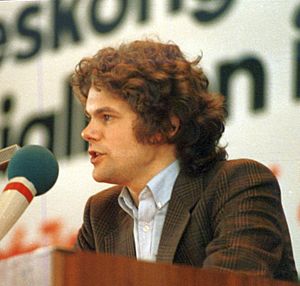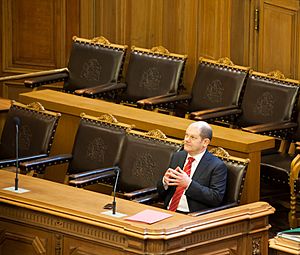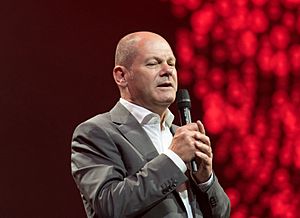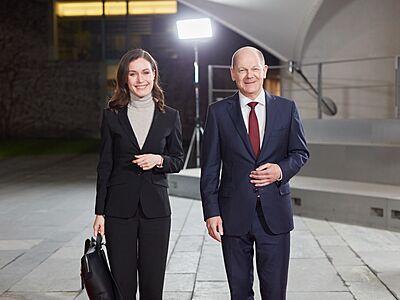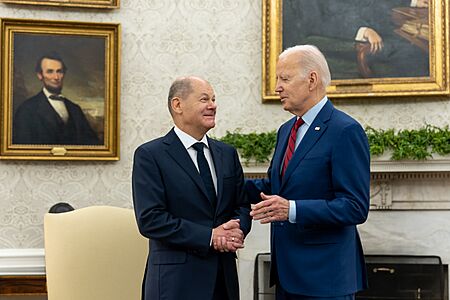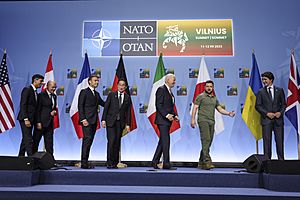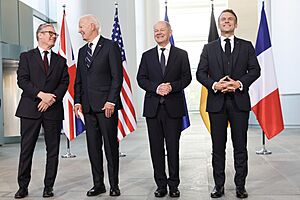Olaf Scholz facts for kids
Quick facts for kids
Olaf Scholz
|
|||||||||||||||||||||||||||||||||||||||||||||||||||||||||||||
|---|---|---|---|---|---|---|---|---|---|---|---|---|---|---|---|---|---|---|---|---|---|---|---|---|---|---|---|---|---|---|---|---|---|---|---|---|---|---|---|---|---|---|---|---|---|---|---|---|---|---|---|---|---|---|---|---|---|---|---|---|---|
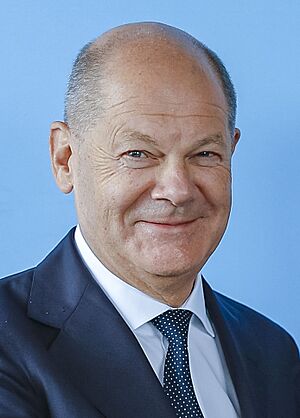
Scholz in 2024
|
|||||||||||||||||||||||||||||||||||||||||||||||||||||||||||||
| Chancellor of Germany | |||||||||||||||||||||||||||||||||||||||||||||||||||||||||||||
| In office 8 December 2021 – 6 May 2025 |
|||||||||||||||||||||||||||||||||||||||||||||||||||||||||||||
| President | Frank-Walter Steinmeier | ||||||||||||||||||||||||||||||||||||||||||||||||||||||||||||
| Vice Chancellor | Robert Habeck | ||||||||||||||||||||||||||||||||||||||||||||||||||||||||||||
| Preceded by | Angela Merkel | ||||||||||||||||||||||||||||||||||||||||||||||||||||||||||||
| Succeeded by | Friedrich Merz | ||||||||||||||||||||||||||||||||||||||||||||||||||||||||||||
| Vice Chancellor of Germany | |||||||||||||||||||||||||||||||||||||||||||||||||||||||||||||
| In office 14 March 2018 – 8 December 2021 |
|||||||||||||||||||||||||||||||||||||||||||||||||||||||||||||
| Chancellor | Angela Merkel | ||||||||||||||||||||||||||||||||||||||||||||||||||||||||||||
| Preceded by | Sigmar Gabriel | ||||||||||||||||||||||||||||||||||||||||||||||||||||||||||||
| Succeeded by | Robert Habeck | ||||||||||||||||||||||||||||||||||||||||||||||||||||||||||||
| Minister of Finance | |||||||||||||||||||||||||||||||||||||||||||||||||||||||||||||
| In office 14 March 2018 – 8 December 2021 |
|||||||||||||||||||||||||||||||||||||||||||||||||||||||||||||
| Chancellor | Angela Merkel | ||||||||||||||||||||||||||||||||||||||||||||||||||||||||||||
| Preceded by | Peter Altmaier (acting) | ||||||||||||||||||||||||||||||||||||||||||||||||||||||||||||
| Succeeded by | Christian Lindner | ||||||||||||||||||||||||||||||||||||||||||||||||||||||||||||
| First Mayor of Hamburg | |||||||||||||||||||||||||||||||||||||||||||||||||||||||||||||
| In office 7 March 2011 – 13 March 2018 |
|||||||||||||||||||||||||||||||||||||||||||||||||||||||||||||
| Second Mayor | Dorothee Stapelfeldt Katharina Fegebank |
||||||||||||||||||||||||||||||||||||||||||||||||||||||||||||
| Preceded by | Christoph Ahlhaus | ||||||||||||||||||||||||||||||||||||||||||||||||||||||||||||
| Succeeded by | Peter Tschentscher | ||||||||||||||||||||||||||||||||||||||||||||||||||||||||||||
|
|||||||||||||||||||||||||||||||||||||||||||||||||||||||||||||
|
|||||||||||||||||||||||||||||||||||||||||||||||||||||||||||||
| Personal details | |||||||||||||||||||||||||||||||||||||||||||||||||||||||||||||
| Born | 14 June 1958 Osnabrück, West Germany |
||||||||||||||||||||||||||||||||||||||||||||||||||||||||||||
| Political party | Social Democratic (since 1975) |
||||||||||||||||||||||||||||||||||||||||||||||||||||||||||||
| Spouse |
Britta Ernst
(m. 1998) |
||||||||||||||||||||||||||||||||||||||||||||||||||||||||||||
| Alma mater | University of Hamburg | ||||||||||||||||||||||||||||||||||||||||||||||||||||||||||||
| Signature |  |
||||||||||||||||||||||||||||||||||||||||||||||||||||||||||||
Olaf Scholz (born 14 June 1958) is a German politician. He was the Chancellor of Germany from 2021 to 2025. He is a member of the Social Democratic Party (SPD).
Before becoming Chancellor, he was the Vice Chancellor and Federal Minister of Finance from 2018 to 2021. He also served as the First Mayor of Hamburg from 2011 to 2018. Earlier in his career, he was the Federal Minister of Labour and Social Affairs from 2007 to 2009.
Scholz started his career as a lawyer, focusing on laws about work and jobs. He joined the SPD in the 1970s. He was a member of the Bundestag (Germany's parliament) from 1998 to 2011. He also held important roles within his party, like being the general secretary of the SPD.
In 2020, he was chosen as the SPD's candidate for Chancellor in the 2021 German federal election. His party won the most seats. They formed a new government with two other parties: the Greens and the Free Democratic Party. On 8 December 2021, Scholz became Chancellor, taking over from Angela Merkel.
As Chancellor, Scholz led Germany's response to the Russian invasion of Ukraine. He increased Germany's defense budget and sent weapons to Ukraine. He also put the Nord Stream 2 gas pipeline project on hold. His government also faced economic challenges and protests. On 6 November 2024, his government coalition ended. He lost a vote of confidence on 16 December 2024. In the election on 23 February 2025, his party came in third place.
Contents
Early Life and Education
Olaf Scholz was born on 14 June 1958, in Osnabrück, Germany. He grew up in Hamburg. His parents worked in the textile industry. He has two younger brothers.
Scholz went to elementary school and then high school. After finishing high school in 1977, he studied law at the University of Hamburg starting in 1978. He later became a lawyer, specializing in laws about work and jobs. He joined the Social Democratic Party when he was 17.
Scholz was raised in the Protestant Church but later left it. He has said that Germany's Christian history and culture are important.
Political Career
Early Steps in Politics
Young Socialist (1975–1989)
Olaf Scholz joined the SPD in 1975 as a student. He became involved with the Jusos, which is the youth group of the SPD. From 1982 to 1988, he was a Deputy Federal Chairman of the Jusos. He also served as Vice President of the International Union of Socialist Youth from 1987 to 1989. During this time, he expressed views that were critical of the capitalist economy and NATO. He later said that he "made almost all possible mistakes at some point" during this period.
Member of Parliament (1998–2001)
Scholz was first elected to the Bundestag (Germany's parliament) in 1998. He was 40 years old. He worked on issues related to labor and social matters. He left this role in June 2001 to become a Senator in Hamburg.
Senator for the Interior of Hamburg (2001)
On 30 May 2001, Scholz became the Senator for the Interior of Hamburg. This meant he was in charge of internal security for the city. He held this position for a short time. He left office in October 2001 after his party lost the Hamburg state election.
National and State Political Roles
Member of Parliament (2002–2011)
Scholz was elected to the Bundestag again in 2002. From 2002 to 2004, he was the General Secretary of the SPD. He stepped down from this role when the party leader, Gerhard Schröder, resigned.
Scholz also served as the SPD's chief whip in the Bundestag. This meant he helped manage his party's members in parliament. He worked closely with other parties to lead the government. He was also part of a group that watched over Germany's intelligence services.
Minister of Labour and Social Affairs (2007–2009)
In 2007, Scholz became the Minister of Labour and Social Affairs. He was part of Chancellor Angela Merkel's first government.
After the 2009 federal election, the SPD was no longer part of the government. Scholz was then elected as Deputy Leader of the SPD.
First Mayor of Hamburg (2011–2018)
In 2011, Scholz led the SPD in the 2011 Hamburg state election. His party won with 48.3% of the votes. Scholz then became the First Mayor of Hamburg. He resigned from the Bundestag on 11 March 2011 to take on this new role.
As First Mayor, Scholz represented Hamburg and Germany on the world stage. He hosted important guests in Hamburg, like the Prime Ministers of France, the United Kingdom, and Canada.
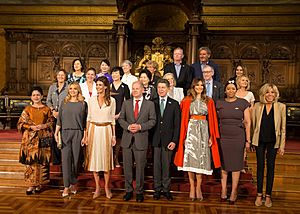
In 2013, Scholz was part of talks to form a new government after the federal election. He helped lead the SPD's team on financial policy.
In 2015, Scholz led Hamburg's effort to host the 2024 Summer Olympics. However, the citizens of Hamburg voted against the idea in a public vote. In 2017, Scholz faced criticism for how he handled protests during the 2017 G20 Hamburg summit in Hamburg.
Vice Chancellor and Minister of Finance (2018–2021)
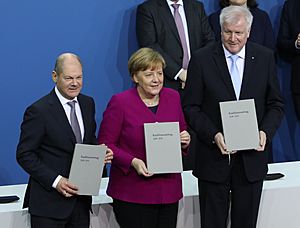
After the 2017 federal election, the CDU, CSU, and SPD agreed to form a new government. Scholz was appointed Federal Minister of Finance. He also became Vice Chancellor of Germany under Angela Merkel. He quickly became one of Germany's most popular politicians.
In 2019, Scholz ran for leader of the SPD but did not win.
During the COVID-19 pandemic in Germany, Scholz created financial support packages for Germany's economy. These packages helped businesses and freelancers. They are often seen as having prevented many job losses. Scholz also helped manage Germany's share of the European Union's COVID-19 recovery fund.
At the 47th G7 summit in June 2021, the G7 countries agreed on a global minimum tax rate for large companies. This idea was proposed by Scholz.
SPD Chancellor Candidate (2021)
On 10 August 2020, the SPD leadership chose Scholz to be their candidate for Chancellor of Germany in the 2021 German federal election.
Scholz led the SPD to a close victory in the election. The party won the most seats in the Bundestag. After this, Scholz was seen as the most likely next Chancellor. The SPD, the Greens, and the Free Democratic Party formed a new government. On 24 November, they reached a coalition agreement.
Chancellor of Germany (2021–2025)
Scholz was elected as Chancellor by the Bundestag on 8 December 2021. He received 395 votes in favor. His new government was appointed on the same day. At 63 years old, Scholz was the oldest person to become Chancellor since Konrad Adenauer in 1949.
-
Scholz and Finnish prime minister Sanna Marin in 2022
-
Scholz with US President Joe Biden in March 2023
Foreign Policy
In December 2021, Scholz visited Warsaw to talk with the Polish prime minister. They discussed the Nord Stream 2 gas pipeline and Poland's issues with the European Union. Scholz supported Poland's efforts to stop migrants from Belarus.
Scholz continued the ban on selling weapons to Saudi Arabia into 2022. This was because of Saudi Arabia's involvement in the conflict in Yemen. In September 2022, Scholz visited the United Arab Emirates, Qatar, and Saudi Arabia. He aimed to build stronger ties and find new energy sources.
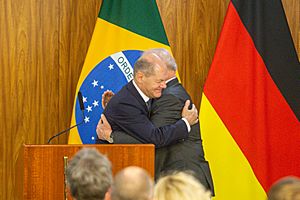
Scholz called the US "Europe's closest and most important partner." He said that what connects Germany and the US is clear.
On 22 February 2022, Scholz announced that Germany would stop the approval of the Nord Stream 2 pipeline. This was in response to Russia's actions in Ukraine.
In an emergency meeting of the Bundestag on 27 February, Scholz gave the Zeitenwende speech. He announced a big change in German military and foreign policy. This included sending weapons to Ukraine and adding €100 billion to Germany's defense budget. This was a major shift for Germany.
In June 2022, Scholz said his government was still committed to stopping the use of nuclear power. This was despite rising energy prices and Germany's reliance on Russian energy.
In August 2022, Scholz disagreed with Palestinian leader Mahmoud Abbas. Abbas had compared Israel's treatment of Palestinians to "apartheid" in South Africa.
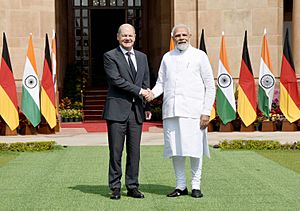
German industries were hit hard by the 2021–present global energy crisis. Scholz said that Germany knew its support for Ukraine would have consequences. In September 2022, Germany announced a €200 billion plan to help industries and households.
In November 2022, Scholz supported the European Green Deal. He confirmed Germany's goal to become climate neutral by 2045.
In March 2023, Scholz met with Azerbaijani President Ilham Aliyev. They discussed natural gas exports from Azerbaijan to Germany and the EU. Scholz said Azerbaijan was becoming an important partner.
In May 2023, Scholz called for a solution to the Cyprus dispute. He suggested a bizonal federation as a preferred solution.
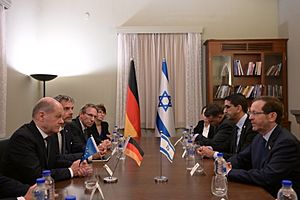
Scholz condemned Hamas' actions during the Gaza war. He expressed support for Israel and sent military and medical aid. He criticized the Palestinian Authority for their silence. On 17 October 2023, Scholz visited Israel. He warned Iran and Hezbollah not to get involved in the conflict.
At the COP28 climate summit in December 2023, Scholz called for an end to fossil fuels. He repeated Germany's goal to be climate neutral by 2045.
In March 2024, Scholz disagreed with the EU foreign policy chief's criticism of Israel. On 28 May 2024, Scholz said his government had no plans to officially recognize a Palestinian state.
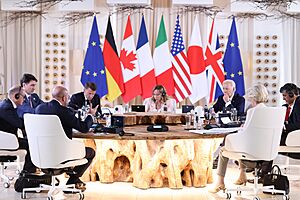
In May 2024, Scholz criticized planned EU taxes on Chinese electric vehicle imports. He noted that many of these cars come from Western brands made in China. In June 2024, Scholz praised Volkswagen for developing cheaper electric cars for Europe.
In June 2024, Scholz welcomed Argentine President Javier Milei to Berlin. Both leaders supported the EU–Mercosur free trade agreement. Scholz urged Brussels to speed up free trade talks.
Relationship with Poland

In December 2021, Scholz rejected Poland's request for more World War II reparations. He stated that past agreements had settled these issues. He also pointed out Germany's large contributions to the EU budget, which Poland has benefited from.
Russian Invasion of Ukraine
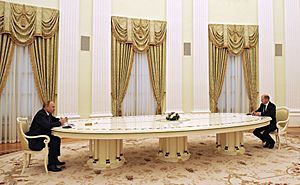
Before the 2022 Russian invasion of Ukraine, Scholz's government was hesitant to take strong action against Russia. Germany initially refused to send weapons to Ukraine.
On 26 February, after the invasion began, Scholz changed his decision. He promised to send anti-tank weapons and Stinger missiles to Ukraine.
The Russian invasion greatly changed Germany's policy on defense spending and aiding Ukraine. Scholz significantly increased German defense spending. He announced a €100 billion fund for the German military. This was a major shift, as Germany had long spent less than 2% of its GDP on defense.
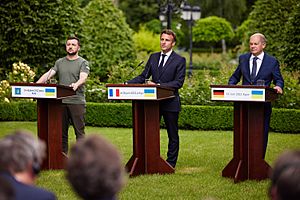
Scholz also announced plans to build new terminals for liquefied natural gas. This was to reduce Germany's reliance on Russian gas. In April 2022, Germany's policy changed further. Scholz announced that Germany would provide Ukraine with over €1 billion for military resources.
From May 2022, Germany's aid to Ukraine grew. On 9 May 2022, Scholz said that Russian President Putin was distorting history. On 16 June 2022, Scholz visited the Ukrainian capital, Kyiv. He met with President Volodymyr Zelenskyy along with the French and Italian leaders.
By September 2022, Germany's arms deliveries to Ukraine were among the largest, after the United States and the United Kingdom.
In January 2023, Scholz announced that Germany would send Leopard 2 battle tanks to Ukraine.
In May 2024, Scholz gave Ukraine permission to strike targets inside Russia with German-supplied weapons.
In July 2024, Russian President Vladimir Putin warned of a new missile crisis. He threatened to deploy long-range missiles if the US placed similar missiles in Germany. Scholz supported the decision to place US long-range missiles in Germany. However, this move was criticized by some as potentially starting a new arms race.
In November 2024, Scholz urged Putin to withdraw forces from Ukraine and start peace talks. This call was criticized by Ukrainian President Zelenskyy.
Domestic Policy
On 6 November 2024, Scholz removed Finance Minister Christian Lindner. This led to the collapse of the governing coalition. Germany also faced an economic recession and a severe housing crisis.
In October 2024, Scholz warned about the decline of German industry. In December 2024, he criticized Volkswagen's plan to close factories in Germany. He suggested a European support program for electric vehicles. He also promised help for the German steel industry, which faced high energy costs.
In September 2024, polls showed Scholz's approval rating was 18%. This was one of the lowest ever for a German chancellor.
COVID-19 Vaccine Mandate
During his 2021 election campaign, Scholz was against a COVID-19 vaccine mandate. However, from late November 2021, he supported mandatory vaccination for adults. He also supported closing non-essential stores to unvaccinated adults.
In January 2022, Scholz told parliament that Germany should make COVID-19 vaccinations mandatory for all adults. He warned that the virus would not disappear without compulsory vaccinations.
Immigration Policy
In December 2021, Scholz said Germany was a country of immigration. He promised to make it easier for immigrants to get German citizenship. In 2023, Germany received 352,000 asylum applications, mostly from Turkey, Syria, and Afghanistan.
In 2022, Scholz stated that Russian soldiers who avoided fighting in Ukraine should be protected in Germany. However, in 2024, German authorities ordered the deportation of some Russian nationals. On 11 September 2024, Scholz said Germany must remain open to immigration for economic growth. He also said Germany would protect those who are politically persecuted.
In August 2024, after a deadly attack in Solingen, Scholz called for stricter immigration rules and faster deportations.
Scholz supports replacement migration to help with Germany's declining and aging population. He said Germany would need 288,000 foreign workers each year. On 14 September 2024, Scholz and Kenyan President William Ruto signed an agreement. This opened the German job market to up to 250,000 skilled workers from Kenya. Scholz's government has also signed similar agreements with other countries like Morocco and India.
Rearmament of Germany
Scholz and Friedrich Merz agreed to change Germany's debt brake rule. This change would allow more spending on defense. Scholz also agreed to create a special fund of €500 billion for infrastructure and climate neutrality.
In March 2025, German lawmakers approved a change to the Basic Law. This allowed the largest rearmament of Germany since World War II. The plan was supported by the SPD, CDU, and the Greens.
SPD Chancellor Candidate (2025)
In November 2024, some SPD members suggested that Defense Minister Boris Pistorius should be the party's chancellor candidate instead of Scholz. However, Pistorius stated he was not interested and fully supported Scholz. Scholz was then unanimously chosen as the chancellor candidate by his party's executive on 25 November 2024. His nomination was confirmed at a party meeting on 11 January 2025.
On 16 December 2024, Scholz lost a vote of confidence in the Bundestag. This led to an election on 23 February 2025. Exit polls showed the SPD came in third place, their lowest result since 1933. Scholz announced he would not join a government led by Friedrich Merz. Scholz was elected to the 21st Bundestag and plans to take up his role as a member of parliament.
Political Views
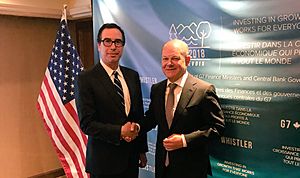
Within the SPD, Scholz is seen as part of the moderate group. Because of his clear and sometimes formal way of speaking, he has been nicknamed "the Scholzomat" by some media. In 2013, he said he found the nickname "very appropriate."
Economic and Financial Policy
Scholz has supported a financial transaction tax for several years. This tax would be on buying shares in large companies. Some experts have criticized parts of this plan, saying it might affect small investors more.
As finance minister, Scholz focused on not taking on new government debt and limiting public spending. In 2018, he suggested creating an EU-wide unemployment insurance system. This would help the Eurozone handle future economic problems better.
Environment and Climate Policy
In September 2019, Scholz helped negotiate a climate package for the SPD. He called it a "great achievement." However, many climate scientists said it was not enough.
In August 2020, Scholz discussed lifting US sanctions on the Nord Stream 2 pipeline. He offered subsidies for US liquid gas imports in return. This caused some debate about the SPD's stance on renewable energy.
The updated Climate Protection Act, introduced when Scholz was Mayor of Hamburg, aims to reduce carbon dioxide emissions by 65% by 2030. It also aims for Germany to be climate neutral by 2045.
Scholz has pushed for more renewable energy to replace fossil fuels. In May 2021, he suggested creating an international "climate club." This club would set common standards for climate policies.
As part of the agreement that made Scholz Chancellor, the SPD, Free Democrats, and Green party agreed to stop using coal for energy by 2030. They also planned to stop using natural gas for power by 2040. The agreement also included rules against natural gas heating in new buildings. They also aimed to end the sale of cars with combustion engines by 2035.
Foreign Policy
In January 2019, Scholz said he saw China mainly as an economic partner. He tried to encourage China to be more open to German businesses. He also supported a trade agreement between the EU and China. In September 2022, he spoke out against the treatment of ethnic Uyghurs in China.
In December 2019, Scholz criticized US sanctions on Russia's Nord Stream 2 gas pipeline. He said such sanctions were a serious interference in Germany's and Europe's affairs. Scholz has supported an agreement that allows American tactical nuclear weapons to be stored in Germany.
In October 2019, Scholz condemned the Turkish invasion of Kurdish areas in northeastern Syria.
In December 2024, Scholz welcomed the fall of the Assad regime in Syria, calling it "good news."
Other Activities
International Organizations
- European Bank for Reconstruction and Development (EBRD), member of the board of governors (2018–2021)
- European Investment Bank (EIB), member of the board of governors (2018–2021)
- European Stability Mechanism, member of the board of governors (2018–2021)
- Asian Infrastructure Investment Bank (AIIB), member of the board of governors (2018–2021)
- International Monetary Fund (IMF), alternate member of the board of governors (2018–2021)
Corporate Boards
- KfW, member of the Board of Supervisory Directors (2018–2021)
- RAG-Stiftung, member of the board of trustees (2018–2021)
- HafenCity Hamburg GmbH, chairman of the supervisory board (−2018)
Non-profits
- Lebendige Stadt Foundation , member of the board of trustees (2009–2021)
- Deutsche Nationalstiftung , member of the Senate
- Friedrich Ebert Foundation (FES), member
- German Council on Foreign Relations (DGAP), chairman of the Task Force on International Aviation Policy
Personal Life
Olaf Scholz is married to Britta Ernst, who is also a politician from the SPD. They lived in Hamburg before moving to Potsdam in 2018.
Scholz was raised in the Protestant Church but later left it. When he became Chancellor in 2021, he took his oath of office without mentioning God. He is the first Chancellor of Germany who is not a member of a church.
See also
 In Spanish: Olaf Scholz para niños
In Spanish: Olaf Scholz para niños
- Senate Scholz I
- Senate Scholz II
 | Frances Mary Albrier |
 | Whitney Young |
 | Muhammad Ali |


